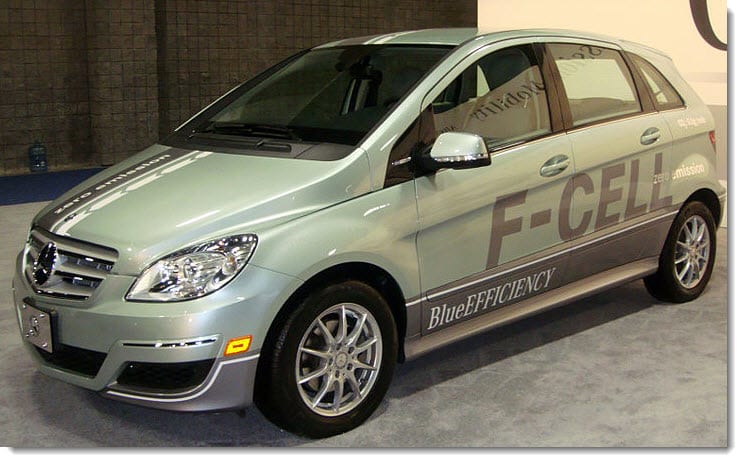Automaker announces plans for hydrogen fuel vehicle
December 17, 2013Mercedes-Benz continues support of fuel cells
 Mercedes-Benz has a strong history with hydrogen fuel. The German automaker was the first to take three hydrogen-powered vehicles it had developed on a world tour in 2011. This initiative was meant to showcase the abilities of hydrogen fuel cells and dispel some of the criticism that had come to surround the energy systems. The tour proved quite successful, as the automaker’s vehicles were able to accomplish their goals without encountering any significant problems.
Mercedes-Benz has a strong history with hydrogen fuel. The German automaker was the first to take three hydrogen-powered vehicles it had developed on a world tour in 2011. This initiative was meant to showcase the abilities of hydrogen fuel cells and dispel some of the criticism that had come to surround the energy systems. The tour proved quite successful, as the automaker’s vehicles were able to accomplish their goals without encountering any significant problems.
Automaker shows some concern regarding challenges that lay ahead
While the automaker had found early success with its hydrogen-focused initiatives, the company has been slowing its development of a hydrogen fuel vehicle in recent years. Mercedes-Benz remains a strong supporter of hydrogen transportation, but there are many challenges that the auto industry must overcome before hydrogen-powered vehicles can be considered viable in the global market. Despite the challenges that exist, Mercedes-Benz is keen to launch one of its own hydrogen-powered vehicles into the market, though this vehicle may come later than those being offered by other automakers.
Mercedes-Benz plans to launch hydrogen fuel vehicle in 2017
Mercedes-Benz has announced that it will be launching a hydrogen-powered vehicle in 2017, nearly two years after other automakers launch their own fuel cell vehicles. The new vehicle will be based on Mercedes-Benz’s B-Class F-Cell vehicle, which successfully traveled the world in 2011. The automaker claims that the hydrogen fuel vehicle will have a driving range of 248 miles. The vehicle will also be equipped with a lithium-ion battery that will be used to provide extra power to its front wheels.
Consumers unconvinced of viability of fuel cells
The use of hydrogen fuel in transportation has been a difficult concept to sell to consumers. Many believe that fuel cells are simply too expensive and inefficient to be a viable alternative to conventional vehicles or those that rely solely on lithium-ion batteries. Many automakers are not looking to replace other kinds of vehicles, however, but offer more options to consumers in order to help diversify the transportation field. The end goal may, indeed, be to phase out older style vehicles that rely on fossil-fuels, but this is not expected to happen for several years.

 With over 15 years of reporting hydrogen news, we are your premier source for the latest updates and insights in hydrogen and renewable energy.
With over 15 years of reporting hydrogen news, we are your premier source for the latest updates and insights in hydrogen and renewable energy.